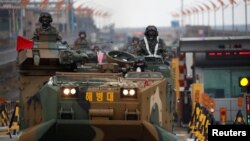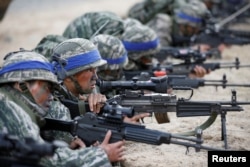After the United States announced it was suspending a joint air defense military exercise with South Korea, Seoul announced it will conduct its own drill.
The joint aerial exercise Vigilant Ace had been planned for December 2018, but was canceled by the Pentagon to give diplomatic efforts with North Korea "every opportunity to continue.”
Experts speaking to VOA were divided on whether conditions on the peninsula had advanced enough to warrant the exercise’s suspension and have their intended effect.
Vigilant Ace is one of two major exercises suspended since the June Singapore summit between U.S. President Donald Trump and North Korean leader Kim Jong Un. The exercises were suspended to ease tensions on the peninsula and encourage dialogue with Pyongyang, so it would abandon its nuclear weapons and ballistic missile programs.
But a South Korean defense ministry official announced on Monday, “No changes will be made to the drill to be staged by the South Korean Air Force, though the joint programs will not take place.”
Last year, the joint Vigilant Ace exercise had more than 230 aircraft and around 12,000 U.S. service members participating.
Incentivising North Korea
The two Korean leaders have met three times in 2018, most recently in September, when South Korean President Moon Jae-in traveled to Pyongyang to meet with North Korean leader Kim Jong Un.
Kim Dong-yub, Kyungnam University’s Head of Office Research at the Institute for Far East Studies, tells VOA the cancellation reflects changes on the Korean peninsula and in the North Korea - United States relationship.
That sentiment is not shared by Daniel Pinkston, international relations lecturer at Seoul’s Troy University.
“It appears that the intention of the cancellations is to persuade or encourage North Korea to make progress in denuclearization, but North Korea has already made those commitments in the past [and] I don't know if this is going to convince North Korea,” said Pinkston.
He said from an arms control perspective, if joint military drills between the United States and South Korea are halted, then North Korea should cancel or tone down their upcoming winter drills.
Kim Dong-yub stresses that not all joint exercises between Seoul and Washington are being canceled.
“This is a tentative decision” and officials can resume military exercises should circumstances on the peninsula change, he said.
But Dongguk University professor Kim Yong-hyun doesn’t think there is much difference between temporarily suspending drills or outright canceling them.
“I believe [suspending or canceling the drills] is a measure to encourage North Korean denuclearization,” said Kim Yong-hyun.
He said that while this is a temporary measure, there’s a high probability the trend of suspending or canceling exercises could continue.
But Pinkston said he doesn’t, “see how canceling the exercises makes the peninsula more secure or stable.”
He doesn’t assume North Korea will denuclearize because drills, like Vigilant Ace, are suspended.
“There seems to be some kind of pretend or make-believe narrative in some circles and certain governments, that maybe some people are making that assumption, but I don't think that assumption really holds or is plausible,” said Pinkston.
Implications for Seoul carrying out their own drills
Seoul planning to carry out its own aerial exercises, without the United States, should pose no irritation to Pyongyang, said Kim Yong-hyun.
North Korea often calls the large-scale joint exercises with U.S. troops and their South Korean counterparts “provocative” and has requested they be canceled for quite some time.
“Military professionals can sit down and have a detailed discussion” on the cancellation of drills, said Pinkston.
He noted that under the terms of the armistice agreement, “both sides have an obligation to maintain the ceasefire and military professionals know what [exercises are] threatening or intimidating.”
The communication mechanism provides for “open and clear discussion.”
“If both sides want to get into a threat reduction process and scale down or scale back exercises that will encourage or instill mutual confidence, then I would welcome that. But, there doesn't seem to be much coordination and cooperation,” Pinkston said.
Kim Yong-hyun theorizes that because the South Korean drills are not carried out on the same scale as the joint exercises, it would be viewed by Pyongyang as a form of “general practice,” and not contribute to an increase in regional tension.
The cost of cancellation
United States military personnel typically are stationed on the Korean peninsula for one year; therefore, they typically have only one opportunity to go through the complete “training cycle.”
Pinkston said being ready should the armistice collapse, or if another problem were to arise requiring military force, is “instrumental and critical.”
In addition, RAND Corporation Senior International and Defense Researcher Bruce Bennett points out another reason the joint exercises are conducted is, “to introduce them to their Korean colleagues to get them starting working together.”
“That’s something that’s got to continue,” said Bennett.
Lee Ju-hyun contributed to this report.






